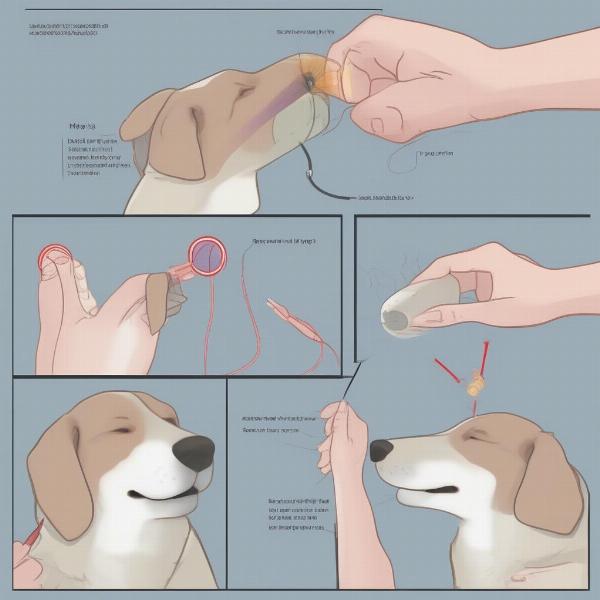Dog ear bleeding can be alarming for any owner. While some causes are minor and easily treated, others can indicate a more serious underlying condition. Understanding the potential reasons for your dog’s ear bleeding, knowing what to do at home, and when to seek veterinary care is crucial for their well-being.
Why is My Dog’s Ear Bleeding?
Several factors can lead to bleeding from a dog’s ear. It could be as simple as a scratch from excessive itching, or something more serious like an ear infection, ear mites, a foreign object lodged in the ear canal, or even a ruptured eardrum. Trauma, such as a bite wound or a head injury, can also cause bleeding. In rarer cases, tumors or blood clotting disorders might be responsible. Identifying the underlying cause is key to effective treatment.
What Should I Do if My Dog’s Ear is Bleeding?
If you notice your dog’s ear bleeding, the first step is to remain calm and assess the situation. Try to determine the severity of the bleeding. Is it a small trickle or a more substantial flow? If the bleeding is profuse, apply gentle pressure to the ear using a clean cloth and seek immediate veterinary attention. If the bleeding is minor, try to examine the ear carefully, looking for any obvious foreign objects, wounds, or signs of inflammation.
 How to Examine a Dog's Ear for Bleeding
How to Examine a Dog's Ear for Bleeding
When Should I Take My Dog to the Vet?
dog ear tip bleeding While some minor ear bleeds may stop on their own, it’s crucial to consult a veterinarian if: the bleeding is heavy or doesn’t stop within a few minutes, your dog appears to be in pain, you suspect a foreign object is lodged in the ear canal, there are signs of infection (such as swelling, redness, or discharge), or the dog has experienced a recent head injury.
“Even seemingly minor ear injuries can lead to complications if left untreated,” says Dr. Emily Carter, DVM. “A prompt veterinary examination is always the best course of action to ensure your dog’s health and prevent further issues.”
Home Care and Prevention
While you should never attempt to treat a serious ear injury at home, you can take steps to prevent future problems. Regularly cleaning your dog’s ears with a veterinarian-approved cleaner can help prevent infections and mite infestations. Keeping their ears dry after swimming or bathing is also important. dog ear bleeding Be mindful of potential hazards in your environment, such as sharp objects or plants that could injure their ears.
“Preventive care is key to maintaining your dog’s overall health, including their ear health,” adds Dr. Carter. “Regular checkups and proper ear hygiene can help identify and address potential problems early on.”
Conclusion
Dog ear bleeding can range from a minor annoyance to a sign of a serious health concern. Understanding the potential causes, knowing how to respond, and seeking veterinary care when necessary are vital for ensuring your dog’s well-being. Regular preventative care, including ear cleaning and checkups, can help minimize the risk of future ear problems. tail protection for dogs Remember to consult your veterinarian for accurate diagnosis and treatment.
FAQ
- What if I see a dark, dried substance in my dog’s ear along with the blood? This could indicate dried blood or ear mites. Consult a veterinarian for a proper diagnosis.
- Can ear infections cause bleeding? Yes, severe ear infections can cause inflammation and bleeding within the ear canal.
- My dog keeps shaking its head and scratching its ear. Could this be related to bleeding? Yes, head shaking and scratching can be signs of ear irritation, infection, or injury, which could lead to bleeding.
- Is it safe to clean my dog’s ear if it’s bleeding? No, do not attempt to clean the ear if it is bleeding. Seek veterinary care.
- How can I prevent my dog from scratching its ears? Addressing underlying issues like allergies or ear infections is key. An Elizabethan collar can temporarily prevent scratching.
- Can ear mites cause bleeding in dogs? Yes, excessive scratching due to ear mites can lead to abrasions and bleeding in the ear canal.
- What if the bleeding is coming from the ear flap and not the ear canal? dogs knotting women While less common, ear flap injuries can also bleed. Consult a veterinarian to determine the cause and appropriate treatment.
ILM Dog is your trusted source for expert advice on all aspects of dog care, from breed selection and health to training, nutrition, grooming, and more. We offer valuable insights and practical tips to help you provide the best possible care for your canine companion. dog ear revision before and after For personalized guidance and expert support, contact us at [email protected] or call us at +44 20-3965-8624. Visit ILM Dog today for all your dog care needs.